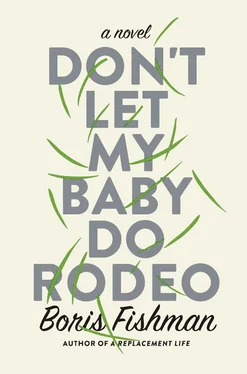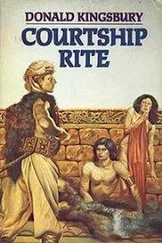She put down her knife and rubbed his shoulder. “But where would you be?”
“Like when we go to Mexico. Do you still make dinner?”
“No, I don’t, sweetheart. Not really.”
“So you do it for us.”
“In a way.”
“So what do you do when no one’s around?”
“What, honey?” she bent down.
“When you’re by yourself. What do you do?”
“I don’t know, baby. I’m not alone that often. When you go away to Mexico, I miss you. I walk around the house. I don’t do much of anything. Maybe it’s not right and I should do more with myself. Why are you asking me?”
He said he was curious.
“Is that why you ran away, Max? Because you wanted to be alone?”
“No,” he said. “I told you — I was sad.”
“But why did that make you want to be alone — instead of with us?”
“I don’t know,” he said.
She let him be.
About Bender, Max had been told that his mother needed to see the psychologist — in the view of some, this was the truth — and could Max come along, because then they could go for bagels, his favorite; his mother had been wanting some, too. When the prescribed hour came, Max came down from his room only on the third summons. He looked pale and sleepy. His jeans hung on him like a laundry bag, and he hadn’t even hitched them with a belt. Maya let it be, but Alex stared at his son distrustfully.
In the backseat — starting to do Bender’s work before they reached Bender, Eugene again claimed that Max was spoiled by indulgence and insisted the boy be retired from the front — Max watched the leafing trees rush by even though Eugene had affixed a DVD player to the back of the passenger seat in consolation. Max had never shown an interest in movies. He had liked blocks, picture books with popping-up animals, little mallets, buttons, and knobs — he dragged it all around, liking the feel in his hands.
Next to Max in the backseat, like a squat, silent animal, rode a case of Turkish cherry jam, an enticement from Eugene to Bender. No Rubin had called a Bender in more than a year, and if memory served — and in such cases, at least on the aggrieved side, memory served dutifully — a Bender had been the last to issue a halfhearted invitation to socialize. So when Maya insisted that Max see a psychologist, Eugene agreed not because he thought the man could be useful — psychologists were charlatans, in his view — but because, disparage Bender or not, the ignored invitation had been eating at him. Eugene declined to be the one to call Bender, however, leaving diplomacy to Anatolian cherries.
“We’re paying him,” Alex had said when his father had proffered the tray, each bottle blown in the shape of a laughing pasha. “I can’t believe he’s charging us, but he is. This isn’t necessary.”
“It’s the jam they serve with tea at the steam baths,” Eugene said. “Bender can develop positive associations and charge you less.”
Alex wanted to call no more than his father, but Bender was a Rubin-side friend — Bender’s wife and Raisa had met at a grocery store years before and dragged the men into acquaintance. More importantly, Bender was the lesser of the evils Maya had dreamed up, the other being an American therapist. And so — even though Max was seeing a psychologist on his wife’s restless urging; even though it was his mother who had drawn the first bridge to the Benders; even though it was Eugene who had insisted on ignoring Bender’s last invite — somehow the privilege of calling Bender had fallen to Alex. He knew that Bender would respond to Alex’s greeting with a long, satisfied silence. But it was even longer than Alex expected. Alex interrupted Bender’s pleasure and tried to explain the issue in a brief, halting monologue, which Bender cut off to issue the magnanimity for which Alex had hoped. “I would be more than happy to see the boy,” he had said in a narrowly professional tone. Then he clarified that it was uncustomary for him to answer the telephone — he had a receptionist; two in the morning, such was demand — and that Bella out front would take down the details. “We take cash and credit cards but no checks,” Bender specified before instructing Alex to hold the line.
As chatty as her employer was clipped — given Max’s name and age, Bella sighed and broke into a sedative patter — the receptionist caused Alex a mild palpitation when she named the cost of a forty-five-minute session (one hundred dollars). “It’s twenty-five dollars less than the usual rate,” she said. Sensing this wasn’t enough, she added: “And a hundred and fifty less than a therapist in the city.”
+
“What have I been up to?” Bender asked. Alex and Maya were seated in front of him, Max outside in reception. Alex had been considering the psychologist’s office with hostility — a globe on a spindle; a foot-long replica of a sailboat replete with baby sailors; for some reason, scales of justice — and had asked the question with an excessive and insincere enthusiasm. Bender joined his hands and shrugged: “I have written a book.” He rose and extracted a slim volume from a wood-paneled bookshelf that held heavy blue tomes expressing the full range of mental disorder. Between them, the glossy white volume roosted insignificantly, though Bender had augmented its presence by stacking a dozen copies together. “You can keep it,” he said, returning to his chair. “Maybe you’ll learn something.” They watched his thin fingers scrawl out a dedication on the front page.
In general, he had not aged. He did not look younger than his fifty-five or so, but not older, either. It occurred to Alex that it was this stranded age that made socializing difficult, for Bender and his wife (technically she was younger than Bender, but she looked like his mother, which always made Alex think of George H. W. and Barbara Bush, during whose tenure Alex and Maya had married) were older than Alex and Maya but younger than Eugene and Raisa. His own haleness Bender had once, on being faced with a less-than-salubrious table at the Rubins’, attributed to being a gourmand. (That is what he said: “I am a gourmand,” which Eugene sang out in mockery at least once a week.) Bender ate sushi three times a week and boiled greens most of the rest and did not long for any of the sinful indulgences Raisa had laid out. “You have a lucky metabolism,” he had said to Eugene, “but cholesterol is cholesterol. You are thin thanks to genes. I am thin thanks to consciousness.” “It turns out he’s a nutritionist also,” Eugene had said, flicking a slice of peppered fatback into his mouth.
“There you are,” Bender said, extending the title. Maya and Alex both reached for it, which led to nervous laughter. The Revelation of a Russian Psychotherapist on the American Land , the cover said. It depicted, in one collapsed tableau, a kerchiefed woman in a peasant smock alighting from a ship hold with a dusty valise and a trembling smile; the Statue of Liberty, its face crossed with something other than joy on sighting this belted Madonna of steerage; and the Chrysler Building piercing the sky like a phallus. The book was self-published and written directly in English.
“We will read it very closely,” Maya said.
“There is a section on the psychological lessons of Russian literature,” Bender said. “I hope it meets with Raisa’s approval.” Raisa had been a literature instructor in the Soviet Union. Bender bent his head in tribute.
“They send their greetings,” Maya rushed to add.
“How is Eugene?” Bender’s face clouded over. “I’m grateful for the jam, but in honesty — too much sugar. There are sugarless jams — he should look into it.”
“Since our time is so short,” Alex broke in, “we would like to tell you the situation with Max.” Alex looked at Maya, hoping she would continue.
Читать дальше












